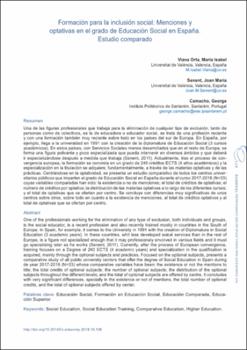Formación para la inclusión social: Menciones y optativas en el grado de Educación Social en España. Estudio comparado
Date
2018Abstract
Una de las figuras profesionales que trabaja para la eliminación de cualquier tipo de exclusión, tanto de
personas como de colectivos, es la de educadora o educador social, se trata de una profesión reciente
y con una formación también muy reciente sobre todo en los países del sur de Europa. En España, por
ejemplo, llega a la universidad en 1991 con la creación de la diplomatura de Educación Social (3 cursos
académicos). En estos países, con Servicios Sociales menos desarrollados que en el resto de Europa, se
forma una figura polivante y poco especializada que pueda intervenir en diversos ámbitos y que deberá
ir especializándose después a medida que trabaja (Senent, 2011). Actualmente, tras el proceso de convergencia
europea, la formación se concreta en un grado de 240 créditos ECTS (4 años académicos) y la
especialización en la titulación se adquiere, fundamentalmente, a través de las materias optativas y de las
prácticas. Centrándose en la optatividad, se presenta un estudio comparativo de todos los centros universitarios
públicos que imparten el grado de Educación Social en España durante el curso 2017-2018 (N=33)
cuyas variables comparadas han sido: la existencia o no de menciones; el total de créditos de optativas; el
número de créditos por optativa; la distribución de las materias optativas a lo largo de los diferentes cursos;
y el total de optativas que se ofertan por centro. Se concluye con diferencias muy significativas de unos
centros sobre otros, sobre todo en cuanto a la existencia de menciones, al total de créditos optativos y al
total de optativas que se ofertan por centro. One of the professionals working for the elimination of any type of exclusion, both individuals and groups,
is the social educator, is a recent profession and also recently trained mostly in countries in the South of
Europe. In Spain, for example, it comes to the University in 1991 with the creation of Diplomatura in Social
Education (3 academic years). In these countries, whit less developed soical services than in the rest of
Europe, is a figure not specialized enough that it may professionaly envolved in various fields and it must
go specializing later as he works (Senent, 2011). Currently, after the process of European convergence,
training focuses on a Degree of 240 ECTS (4 academic years) and specialization in the qualification is
acquired, mainly through the optional subjects and practices. Focused on the optional subjects, presents a
comparative study of all public university centers that offer the degree of Social Education in Spain during
de year 2017-2018 (N=33) whose comparative variables have been: the existence or not the mentions to
title; the total credits of optional subjects; the number of optional subjects; the distribution of the optional
subjects throughout the different levels; and the total of optional subjects are offered by centre. It concludes
with very significant differences, specially in the existence or not of mentions, the total number of optional
credits, and the total of optional subjects offered by center.
Except where otherwise noted, this item's license is described as Licencia Creative Commons (Reconocimiento-No comercial-Sin obras derivadas 4.0 internacional)
Related items
Showing items related by title, author, creator and subject.





